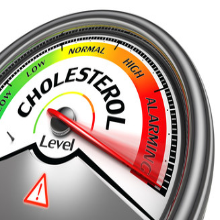Cholesterol is a type of fat in the blood that is essential for health. It is needed to build and repair cells, to make bile acids (to absorb fats and...
Cholesterol is a type of fat in the blood that is essential for health. It is needed to build and repair cells, to make bile acids (to absorb fats and some vitamins) and hormones.Cholesterol is made in the liver and is also in some of the food that we eat. It is only found in animal products. The quality of fat that a person eats influences how much cholesterol their liver makes and the amount of cholesterol in the blood.
Because blood (mostly water) and cholesterol (a type of fat) does not mix, the body uses a special carrier to transport cholesterol around the bloodstream. These are called lipoproteins. There are several types of lipoproteins, with the key ones being:
- Low-Density Lipoproteins (LDL). These carry cholesterol from the liver to all cells in the body. LDL is often known as the “bad cholesterol” because it can contribute to fatty deposits called plaque forming in the arteries. This leads to narrowing and hardening of the arteries, increasing the risk of heart attacks and stroke.
- High-Density Lipoproteins. These carry cholesterol from the cells back to the liver for recycling or disposal. HDL is often referred to as the “good cholesterol” because it helps to remove cholesterol from the arteries.
1 in 3 Australian adults have high cholesterol levels (1). Maintaining healthy cholesterol levels is important to reduce the risk of developing heart disease.
What Causes High Cholesterol?
Some causes of high cholesterol include (1):
- Low intake of foods containing healthy fats. Healthy fats may help to increase HDL (good) cholesterol.
- High intake of foods containing unhealthy fats (saturated and trans fats). Fatty meats, full fat dairy products, butter, palm oil and deep fried take away foods and commercially baked products (pies, sausage rolls. Biscuits, buns and pastries) are high in unhealthy fats.
- Low intake of fibre-rich foods. Food high in fibre (such as fruit, vegetables, wholegrains, nuts and seeds) can help to reduce LDL cholesterol.
- Your family history may affect your cholesterol level. This is known as familial hypercholesterolaemia.
What can you do?
Sticking to a healthy and varied diet can help with cholesterol levels. Making sure that you:
- Eat plenty of vegetables, fruit and wholegrains
- Include a wide variety of protein sources, including fish, legumes, nuts and seeds, lean chicken and meat, and limit red meat to 1-3 times a week.
- Choose healthy fats – think plant-based fats including nuts, seeds, avocado, olives and their oils. Salmon and other oily fish are also included in healthy fats.
- Use herbs and spices to flavour foods instead of adding salt.
As well as sticking to a healthy diet, you can:
- Limit takeaway foods such as pastries, pies, pizza, hot chips, hamburgers, etc.
- Limit salty, fatty or sugary snack foods such as chips, cakes, biscuits, lollies and chocolate.
- Eat plenty of vegetables – aim for 5 serves a day, or 2-3 handfuls in each meal.
- Choose wholegrain breads, rice, noodles and pasta.
- Snack on plain, unsalted nuts or fresh fruit.
- Include legumes in your meals. These include chickpeas, lentils, kidney beans, cannellini beans, black beans.
- Use healthy oils for cooking – olive oil, avocado oil, nut oils.
- Choose lean meats and limit or avoid processed meats such as sausages, salami, etc.
You can also make some lifestyle change to help reduce cholesterol:
- Increasing physical activity can help to increase HDL cholesterol.
- If overweight, reducing your weight can help to reduce your LDL cholesterol and increase your HDL cholesterol.
- Limit your alcohol intake. See tips in our article here.
- Quit smoking – smoking reduces HDL cholesterol.
- Talk to our AMC naturopaths or nutritionists about a supplement that may help.
References
-
- HealthDirect, ‘How to Lower Your Cholesterol’, Australian Government Department of Health, viewed on 9 February 2022, https://www.healthdirect.gov.au/how-to-lower-cholesterol
- Victoria State Government, 2021, ‘Cholesterol – healthy eating tips’, viewed on 9 February 2022, https://www.betterhealth.vic.gov.au/health/conditionsandtreatments/cholesterol-healthy-eating-tips
About The Author - AMC Team
Our team consists of doctors, nurses, program assistants, naturopaths and nutritionists that join their wealth of knowledge to offer our patients and website visitors interesting and insightful articles to assist you understand the symptoms you are experiencing and how to relieve them.
You’ll also like these posts
 Read more
Read more
 Read more
Read more
Cholesterol is a type of fat in the blood that is essential for health. It is needed to build and repair cells, to make bile acids (to absorb fats and...

